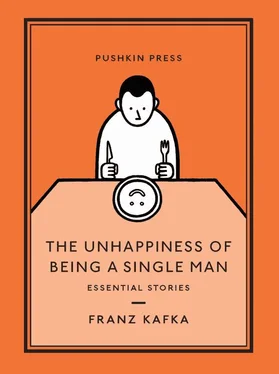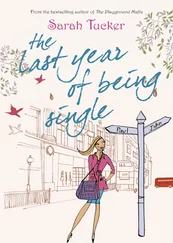“Where is the grave?” asked the researcher, who couldn’t believe what the soldier was saying. Right away, both of them, the soldier and the condemned man, went ahead of him and pointed to where the grave was supposed to be. They led the researcher over to the back wall, where customers were sitting at a few of the tables. They were probably dock workers, strong men with gleaming black beards. None of them had a jacket, their shirts were tattered, they were a poor, beaten-down people. When the researcher came close, some of them stood up, pressed themselves against the walls and stared at him. “He’s a foreigner,” they whispered around the researcher, “he wants to see the grave.” They pushed one of the tables aside and underneath it there really was a gravestone. It was a simple stone, small enough to be hidden under a table. It carried an inscription in very small lettering; the researcher had to kneel down to read it. It said: ‘Here lies the old commandant. His followers, who are now nameless, dug this grave and placed this stone. There is a prophecy that, after a certain number of years, the old commandant will rise again and lead his followers from this house to wrest back control of the colony. Be faithful, and wait for him!’ When the researcher had read this and straightened up, he saw the men standing all around him and grinning, as if they’d read the inscription beside him, found it ridiculous and wanted him to share their opinion. The researcher acted as if he hadn’t noticed, gave out a few coins, waited until the table had been pushed back over the grave, left the tea house and walked down to the harbour.
The soldier and the condemned man were held up by meeting some acquaintances in the tea house. But they must have torn themselves away quickly, because the researcher was still only on the long set of stairs that led down to the boats when they came after him. They probably wanted to force him to take them with him. While the researcher spoke to one of the boatmen about being ferried across to the steamship, the two of them raced down the steps, silently, because they didn’t dare shout. But by the time they reached the bottom, the researcher was already in the boat and the boatman was pushing off from the shore. They could still have jumped into the boat, but the researcher picked up a heavy, knotted rope, threatened them with it and prevented them from jumping.
MY GRANDFATHER used to say: “Life is astonishingly short. When I look back now, it all seems so squashed together that I can hardly understand how a young person could, say, decide to ride to the next village without being afraid—even without any unlucky accidents—that the span of a normal, happy life would not be nearly long enough for him to get there.”
ATRAPEZE VIRTUOSO—whose discipline, practised high in the vaulted domes of the great variety theatres, is famously among the most difficult of any that people can aspire to—had arranged his life in such a way that, initially out of a striving for perfection, then out of increasingly tyrannical habit, he stayed on his trapeze day and night for as long as an engagement lasted. His modest needs were catered to by a rota of attendants who were posted below and hauled everything up and down in specially made containers. The way he lived didn’t create many problems for those around him; it was a little distracting to have him up there during the other acts and, although he mostly stayed quiet, a few glances would nevertheless stray up to him from here and there in the audience. But the producers forgave him that because he was an extraordinary, irreplaceable artist. And of course they also understood that he wasn’t doing it on a whim, that this was his only means of staying in constant training, of keeping his art at its peak.
It wasn’t unhealthy up there and when the weather was warm and the side windows were flung open all round the dome, letting fresh air and strong sunshine pour into the shadowy room, it could be lovely. True, his human contact was very limited; only sometimes did a fellow acrobat climb up to him on a rope ladder; then they’d both sit on the trapeze, leaning against the ropes on each side and chatting. Or some workmen fixing the roof would exchange a few words with him through an open window. Or a fireman checking the emergency lighting on the top floor shouted up one or two respectful, but barely audible, phrases. Other than that, it was quiet around him; from time to time, some stagehand who’d wandered into the empty theatre in the afternoon would glance up thoughtfully into the distant heights where the trapeze artist was practising or resting, unaware that he was being watched.
The trapeze artist could have quietly lived like this had it not been for the unavoidable transfers from venue to venue, which badly disrupted his peace of mind. His manager did try to make sure that the artist’s discomfort was kept to a minimum: when they travelled within a city they used sports cars, ideally at night or in the earliest hours of morning, and raced through the empty streets at top speed, albeit still too slowly for the trapeze artist; on trains they would book an entire compartment, where the trapeze artist could spend the journey up in the luggage rack, an admittedly miserable approximation of his usual life, but better than nothing; in the new venues, the trapeze would be set up long before the artist arrived; all the doors leading to the stage were held open, all the corridors kept clear—and yet, the sweetest moments in the manager’s life were when the trapeze artist set foot on the rope ladder and, before you knew it, was finally hanging from his trapeze again.
No matter how many transfers the manager successfully handled, each new one was still stressful, because aside from anything else, it wore away at the artist’s nerves.
And once, they were travelling together again, the trapeze artist up in the luggage rack, his manager leaning against the window in the opposite corner and reading a book, when the artist spoke to him quietly. The manager was immediately attentive. The artist, biting his lip, said that from now on, instead of just one trapeze, he would need two for his performances, two trapezes opposite each other. The manager agreed at once. But the artist, as if to show that his manager’s agreement was as meaningless as any opposition would have been, said that from now on he would never, under any circumstances, perform on a single trapeze. Just the idea that it might happen again seemed to make him shudder. Once again, cautiously and on alert, his manager said that he was in full agreement, that two trapezes were better than one, and that this new arrangement would bring lots of other advantages, such as allowing more variety in the performances. At that, the trapeze artist burst into tears. Deeply shocked, his manager jumped up and asked what on earth had happened; and since he got no response, he climbed onto the seats, stroked the artist and pressed his face against the artist’s, so that his own cheeks were wet with the artist’s tears. But it was only after many questions and lots of soothing talk that the artist said through his sobs: “Only ever that one bar in my hands—how can I live like that?” After that it was easier for his manager to console him: he promised that he would telegraph ahead from the very next station and arrange the second trapeze; he blamed himself for having let the artist work on a single trapeze for so long, and thanked and praised him for having eventually pointed out his manager’s mistake. In this way, he gradually succeeded in reassuring the trapeze artist, and after a while he was able to go back to his corner. But the manager was not reassured; in grave concern he secretly watched the trapeze artist over the top of his book. Once these kinds of thoughts had begun to gnaw at him, could they ever stop again? Wouldn’t they just keep getting worse? Weren’t they a threat to everything about how he lived? And as the manager watched over the apparently peaceful sleep that the trapeze artist had fallen into once he’d stopped crying, he really thought he could see the first wrinkles beginning to etch themselves into the artist’s boyishly smooth forehead.
Читать дальше












